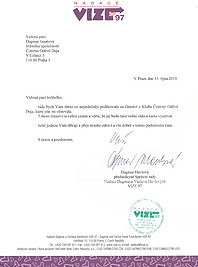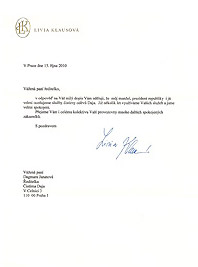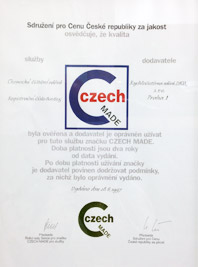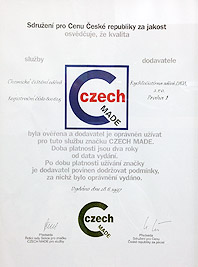Terms of cleaning and complaints Rules
Dear customers, we kindly ask you to carefully read the conditions for cleaning. Daja Dry Cleaners faces ever greater challenges in its field every year. Work becomes more complicated thanks to ever newer textiles and combinations. This represents several problems in care for clothing and textiles. In order to keep pace, we face constant resolution of challenges to preserve the perfection of clothing. Everything is important, be this a small family historical piece, or expensive luxury gown. The dry cleaners Daja tries to save every item for its customers.
Textile clothing
Feather clothing
Leather clothing
Curtains and net curtains
Complaints Rules
GENERAL TERMS AND CONDITIONS
Agreement with the cleaning
Complaints Procedure
I. Preliminary Provisions
- The relations between the company D-Eco Friendly Company s.r.o., ID No.: 08085218, with its registered office at Radlická 2343/48, 150 00 Prague 5 – Smíchov, registered in the Commercial Register maintained by the Municipal Court in Prague, Section C, Insert 312767, as the contractor (hereinafter referred to as "contractor") and the customer, as the orderer, unless otherwise provided for, shall be governed by the Czech legal order, in particular by Act No. 89/2012 Coll., the Civil Code, as amended by later regulations (hereinafter referred to as "the Civil Code"), especially by the provisions of § 2586 et seq. of the Civil Code, which legally regulate the contract for work.
- In cases where individual terms are not defined in this legal document (hereinafter referred to as the "complaints procedure"), the interpretation of the general terms and conditions of the contractor applies, and furthermore, the general interpretation that is regularly attributed to them in legal transactions.
-
The contractor, based on the created order (expressed consent of the orderer with the provision of the service, in accordance with the issued tax document), performs the services provided by him, especially maintenance and modification of the item.
- Maintenance of the item is considered to be chemical or wet cleaning of the item.
- Modification of the item is considered to be making a modification within the scope resulting from the orderer's order.
- It is assumed that the item handed over for the provision of the service is not a new item and shows signs of normal wear and tear. Signs of normal wear and tear are always highlighted after cleaning.
- The orderer is obliged to carefully read all information and warnings regarding the provided service, displayed at the contractor's premises and on the contractor's website before handing over the order for the requested service. The orderer is obliged to remove non-textile (decorative metal, plastic, and other accessories) parts from the item before performing maintenance, due to possible damage.
II. Acceptance of the Item by the Contractor and Issuance of a Written Confirmation
-
The contractor shall issue a written confirmation of the acceptance of the order at its branches, which confirmation shall include information on the identification of the item, the type and extent of the service provided, quality, price, and the deadline by which the service will be performed.
- A confirmation of the acceptance of the order according to Art. II, point 1 of this complaints procedure shall also be issued by the contractor in the case that the fulfillment is performed while waiting and also on the e-shop.
- If the quality is not stated on the confirmation of the acceptance of the order, it is considered that the service is performed in the usual quality.
- If the contractor finds that the price for the service is to be different from that stated in the order (tax document), the contractor shall immediately inform the orderer of this fact, while at the same time the orderer acquires the right to withdraw from the contract.
-
The contractor shall warn the orderer about the unsuitability of the nature of the item for the service before accepting the item.
- If the orderer insists on the service being provided despite the warning by the contractor according to Art. II, paragraph 4 of this complaints procedure, the contractor is entitled to require the orderer to give written consent to perform the requested service.
III. Handover of the Item to the Orderer
-
The orderer is obliged to pick up the items at the branch no later than one week after the expiry of the period in which the service was to be performed, whereby such deadline is stated in the confirmation of acceptance in accordance with Art. II, paragraph 1 of this complaints procedure.
- If the orderer does not pick up the item in accordance with Art. II, paragraph 1 of this complaints procedure, the orderer is obliged to pay the contractor a storage fee for such item in the amount of 50 CZK for each started week when the orderer is in delay with the pickup of the item from the contractor, starting from the day following the day when the orderer was to pick up the item according to Art. II, paragraph 1 of this complaints procedure.
-
The orderer is obliged to inspect the item immediately after receiving it from the contractor and to inform the contractor without unnecessary delay about any apparent defects found during the inspection. The contractor will provide appropriate space for such an inspection.
- If the service is performed based on a contractual arrangement in which the orderer is not a consumer, the contractor is not responsible for defects that the orderer could have discovered by inspection. The contractor has the right to reject a claim in relation to such a defect as belated.
- If the orderer does not pick up the item within six months from the day they were supposed to pick it up according to Art. III, paragraph 1 of this complaints procedure, the contractor has the right to sell the item at the expense of the orderer for the usual price. The contractor has the right to offset unilaterally the claim arising from the performance of the service which the orderer did not pay for, as well as the claim arising from the storage of the item for the period of the orderer's delay in picking up the item. If the contractor, despite sufficient effort, fails to sell the item, the contractor is entitled to donate the item to charity at its discretion.
- In the case of loss of the written confirmation of acceptance of the item by the orderer, the contractor is not obliged to search for information about such confirmation in its records. If the contractor performs such a search, the orderer commits to reimburse the contractor for all associated costs. Furthermore, for the release of the item without presenting the confirmation of acceptance, a precise description of the item by the orderer (at least date, quantity, type, brand) and presentation of identification is required.
IV. Filing a Complaint
- Below is the procedure for the orderer to exercise their rights from faulty performance (hereinafter referred to as "claim").
- The contractor is responsible to the orderer for the service being performed without defects. The contractor is not responsible for removing stains caused by the orderer.
- The contractor is not responsible for defects that arise as a result of the unsuitable nature of the item for the performance of the service, if the contractor has warned the orderer of such nature in accordance with Art. II, paragraph 4 of this complaints procedure.
- In accordance with the provision of § 2594 of the Civil Code, the contractor warns the orderer that some items due to the nature of the material they are made of (especially from highly fashionable materials) are not suitable for maintenance in the form of cleaning (especially washing away impurities). Defects may arise during maintenance in the form of cleaning (especially washing away impurities) due to the unsuitability of materials for maintenance in this form, for which the contractor is not responsible. The contractor is not responsible for any damage that may arise to the orderer in this regard.
-
A claim is made when the service has a defect.
- An apparent defect is such a defect that can be detected with usual attention. The contractor provides appropriate space for inspection of the item when handing it over in accordance with Art. III, paragraph 2 of this complaints procedure for the purpose of detecting such a defect.
- Hidden defects are those that cannot be detected by usual attention (e.g., lower color fastness or higher shrinkage than is specified in technical standards or is usual, material defect, garments after fire, unsuitable material composition or colorfastness, unsuitable manufacturer's recommendations for treatment, unsatisfactory resistance of buttons or decorative elements in the cleaning or washing medium prescribed by the manufacturer by symbols of care sewn into the product (but not applicable to applications), damage by using, garment staining with acid, etc., will only manifest after the service is provided by the contractor. If the item has such a defect when handed over and the orderer conceals such a fact, the contractor is not responsible for the defect that consequently arises.
- It is not considered a defect if the dirt (stain) is not removed from the garment even after proper cleaning by the cleaner.
Procedure for Filing a Claim
- Claims are filed by filling out a form at the address of the respective branch where the service was provided. Only the orderer has the right to file a claim.
- Claims are filed by describing and specifying the manifestation of the defect and by choosing a claim according to Art. IV, paragraphs 11 and 12 of this complaints procedure. If the orderer does not file a claim in time in this way, the contractor has the right to choose how the claim will be addressed. A claim is duly filed by filling out a complaint form at the place of business where the service was provided. Only the orderer has the right to file a claim in this way.
- The orderer is obliged to cooperate with the contractor when filing a claim, especially to hand over the item to the contractor for assessing the legitimacy of the claim.
-
The contractor is obliged to issue a written confirmation to the orderer of when the orderer exercised the right, as well as about the repair and its duration, or about another method of claim settlement within the agreed time. The claim, including the defect, will be settled without unnecessary delay, no later than within 30 days from the day the claim is filed with the contractor unless the parties agree otherwise.
Duration for Filing a Claim
-
The orderer has the right to file a claim for a period of two years after handing over the item.
- If a defect manifests itself within 1 year of handing over the item, it is assumed that the defect was present at the time of handover. This does not apply if the nature of the defect excludes that it occurred in connection with the performance of the service, which the contractor proves when filing a claim in the first year after handing over the item. From the day following one year after the handover of the item, the orderer proves that the nature of the defect does not exclude that it occurred in connection with the performance of the service.
-
The nature of the defect that excludes that it occurred in connection with the performance of the service is given primarily by:
- If the item is not marked with the original unique order number, cash receipt.
- If the condition of the item shows signs of use compared to the condition of the item at handover.
- If the item is altered and the condition of the item does not correspond to the state in which the item was handed over, such as if the item has been ironed, further maintained or
V. Responsibility for Damage
- The contractor shall be liable for any damage caused by the damage, loss, or destruction of the item received from the client for the provision of services.
- The contractor or their authorized representative shall compensate for the damage in monetary terms based on the depreciation table of the residual value of the item. The calculation of the residual value considers the age of the product, according to the standardized table, which is an integral part of the complaint procedure.
- When determining the amount of damage, the price of the item at the time of damage (general price) is considered, taking into account depreciation (wear and tear, age, and defects). The amount of damage compensation is determined by the depreciation table.
- The contractor reserves the right to replace the damaged item with an identical item or, alternatively, with other goods with the same parameters (cut, fabric, brand).
- Depreciation table for residual value calculation: textiles - clothing, bedding and household textiles, leather and fur products.
| Age of the them (years) | Value (%) |
|---|---|
| 0,0 | 100 |
| 0,5 | 76 |
| 1 | 61 |
| 1,5 | 50 |
| 2 | 41 |
| 2,5 | 34 |
| 3 | 29 |
| 3,5 | 25 |
| 4 | 21 |
| 4,5 | 19 |
| 5 | 17 |
| 5,5 | 16 |
| 6 | 15 |
| 6,5 | 14 |
| 7 | 13 |
| 7,5 | 13 |
| 8 | 12 |
| 8,5 | 12 |
| 9 | 12 |
| 9,5 | 10 |
| 10 | 10 |
VI. Alternative Dispute Resolution for Consumer Disputes
- The contractor hereby provides information on alternative dispute resolution in accordance with § 14 of Act No. 634/1992 Coll., on Consumer Protection (hereinafter referred to as "the Consumer Protection Act").
- The contractor further informs the orderer, who is a consumer, about the possibility of alternative dispute resolution. The body competent to deal with disputes between the contractor and the orderer, who is a consumer, is the Czech Trade Inspection Authority. Contact details: Czech Trade Inspection Authority, Central Inspectorate, ADR department, Štěpánská 15, Prague 2, Postal Code: 120 00, email address: adr@coi.cz, website: adr.coi.cz.
VII. Final Provisions
- This complaints procedure applies to all branches and e-shop of the contractor and the contractor's contractual collection points.
- The orderer is obliged to familiarize themselves with this complaints procedure.
- This complaints procedure comes into effect on the 1st of 4, 2024.




















